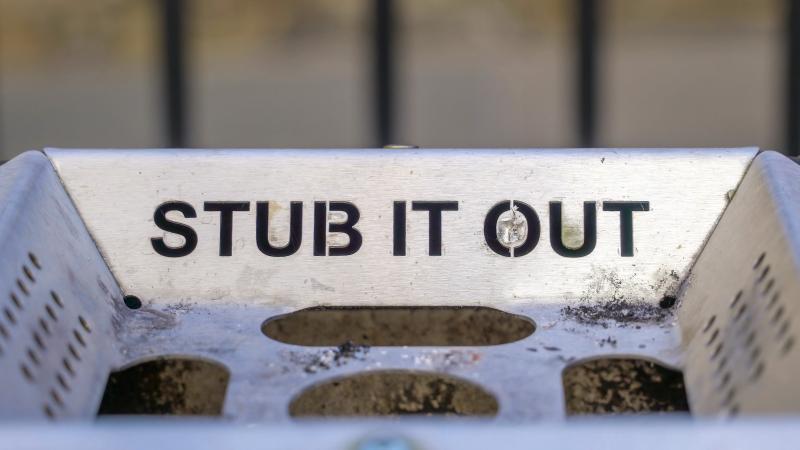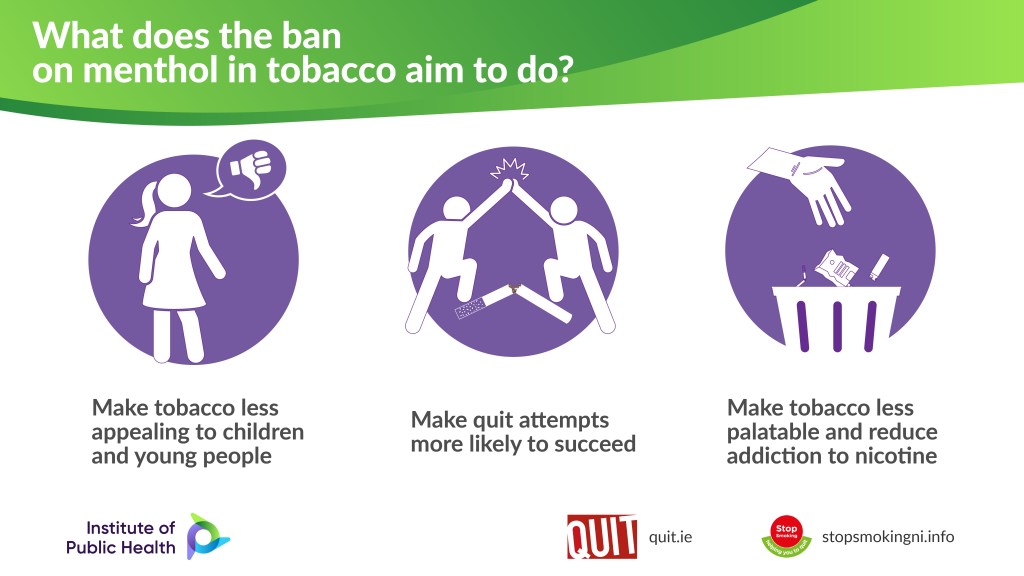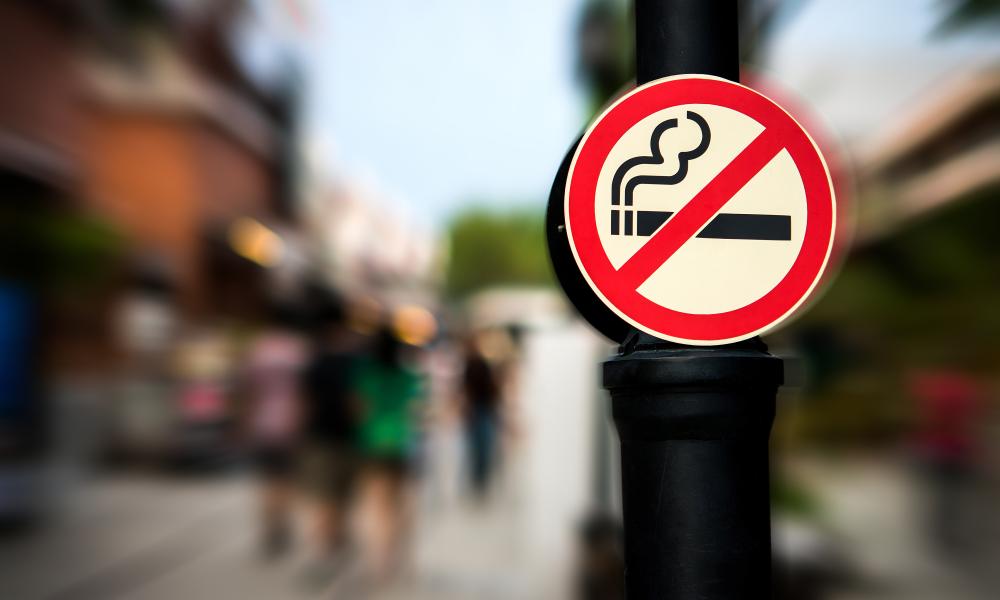
In this blog, Olivia O’Brien, discusses a new law banning the sale of menthol tobacco products across Ireland and Northern Ireland. Olivia is completing an internship with the Institute as part of her Masters in Public Policy at UCD.
With a lot of focus on the response to Covid-19, the ban on the sale of menthol tobacco products from the end of May might have gone unnoticed. But it is an important milestone to recognise in our efforts to reduce tobacco consumption in Ireland and Northern Ireland.
The legislation means that cigarettes and rolling tobacco in Ireland and Northern Ireland are no longer allowed to contain menthol flavouring. This is in accordance with the EU Tobacco Products Directive, the same directive that paved the way for ‘plain’ packaging in 2016, a ban on 10-pack cigarettes and better regulation of tobacco advertising.
Why ban menthol in tobacco?
Menthol masks the smell and taste of tobacco with mint flavouring.
There is extensive evidence that menthol is a tool for tobacco promotion, paving the way for children experimenting and rapidly transitioning to nicotine addiction.1 Evidence also shows that menthol tobacco can make it harder to quit.2
Professor Des Cox, Chair of the Royal College of Physicians of Ireland’s Policy Group on Tobacco and clinician caring for children’s lungs, says that young people are often first introduced to smoking by menthol cigarettes as they find them “attractive, less irritating and more palatable to smoke”.
What does the ban aim to achieve?
The ban aims to:
- Make tobacco less appealing to children and young people.
- Counteract the use of distinguishing flavours as a marketing tactic of the tobacco industry.
- Make tobacco less palatable to children experimenting with tobacco use, and reducing the odds of them transitioning from experimentation to regular smoking and becoming nicotine addicted
- Make quit attempts more likely to succeed.

Other countries have had seen positive signs after banning menthol tobacco. In 2017, the Canadian government reported an increase in quit attempts by menthol smokers after a pilot ban in the province of Ontario. 63% of daily menthol smokers reported making a quit attempt since the ban, compared with 43% of non-menthol smokers.3
The delivery of the menthol ban is in line with the goals set out in Northern Ireland’s ‘Ten-Year Tobacco Control Strategy for Northern Ireland’ and Ireland’s ‘Tobacco Free Ireland’ strategy.
What do we know about menthol tobacco users?
The banning of menthol tobacco products has a real health inequality dimension.
Menthol smokers are mostly young and menthol is a preferred product for child smokers. US research showed that 54% of smokers ages 12-17 use menthol cigarettes, compared to less than one-third of smokers aged 35 and older. 4
Findings from the 2018 Health Behaviour in School-aged Children (HBSC) report – Youth Smoking in Ireland, showed 16% of children aged 9 and older had smoked cigarettes in their lifetime. Overall, 6% of schoolchildren aged 9 and older were classified as current smokers. 5 The banning of menthol should consolidate Ireland’s position as one of the most successful countries in Europe at reducing child smoking.
What sort of responses have there been to the ban?
There has been industry resistance to the ban from an early stage. Menthol flavouring was excluded from the ban on all other flavours by the EU Tobacco Products Directive in 2016. After a strong campaign by the tobacco industry at the European Court of Justice, the ban on menthol was delayed until 2020 to allow smokers time to switch to other products. The four year ‘phasing-out’ period was agreed for all flavoured products with a more than 3% market share in the EU, namely menthol products.
Despite the phasing out period, the industry has sought ways of adapting to the legislation. Examples include using ‘cards’ to add a menthol flavour to traditional tobacco products and wrangling over legal definitions of ‘accessories’ versus tobacco ‘products’. Some companies have developed new products to bypass the ban, others have explored potential loopholes in the promotion and advertising rules. UK based tobacco companies have created menthol ban ‘information’ websites to promote their alternative products.6
In May, PJ Carroll, the Irish subsidiary of British American Tobacco, announced that they plan on launching around 17 new menthol-targeted vaping products for those who would no longer be permitted to purchase menthol cigarettes. 7
Last week the Irish Times reported that Philip Morris International UK and Ireland issued a statement in response to a challenge on advertising their ‘menthol blend’ cigarettes. 8
Those working in health organisations across Ireland, the UK and Europe have welcomed the menthol ban and believe it will contribute to reducing teen smoking.
Welcoming the ban, European Commissioner for Health and Food Safety, Stella Kyriakides said “we are marking an important milestone in our work on tobacco control and in our efforts to protect our youth and to help them to say no to tobacco”.
Further information and how to get help quitting smoking
- For Ireland visit Quit
- For Northern Ireland visit Stop Smoking NI
- For information on the European Tobacco Products Directive (link here)
References
- United States. Public Health Service. Office of the Surgeon General, National Center for Chronic Disease Prevention, Health Promotion (US). Office on Smoking. Preventing Tobacco Use Among Youth and Young Adults: A Report of the Surgeon General. US Government Printing Office; 2012.
- US Food and Drug Administration. Tobacco Products Scientific Advisory Committee (TPSAC). Menthol cigarettes and public health: review of the scientific evidence and recommendations. Rockville, MD: US Food and Drug Administration. Center for Tobacco Products. 2011.
- Chaiton MO, Nicolau I, Schwartz R, Cohen JE, Soule E, Zhang B, Eissenberg T. Ban on menthol-flavoured tobacco products predicts cigarette cessation at 1 year: a population cohort study. Tobacco control. 2020 May 1;29(3):341-7.
- Villanti AC, Mowery PD, Delnevo CD, Niaura RS, Abrams DB, Giovino GA. Changes in the prevalence and correlates of menthol cigarette use in the USA, 2004–2014. Tobacco control. 2016 Nov 1;25(Suppl 2):ii14-20.
- Evans D, O’Farrell A, Sheridan A, Kavanagh P. Youth Smoking in Ireland: A special analysis of the Health Behaviour in School-aged Children (HBSC) study. 2018.
- Tobacco Control Research Group. Menthol Cigarettes: Tobacco Industry Interests and Interference. University of Bath. 2020 Jun 18.
- Pollock S. Menthol ban to affect 200 million PJ Carroll cigarettes. Irish Independent. 2020 May 03.
- Paul M. Philip Morris says Irish ad for ‘menthol blend’ cigarettes a ‘mistake’. The Irish Times. 2020 Jun 19.


